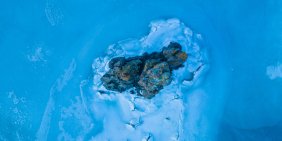
M_ss_ng l_nk

Why directors need a Treaty-first approach to climate change.
Ring-fencing governance issues might work for the boardroom agenda, but director and Environmental Planner Tina Porou (Ngāti Porou, Ngāti Tūwharetoa, Ngāti Rakaipaaka, Ngai Tāmanuhiri) says today’s siloed view of climate change is missing something crucial – iwi Māori.
“We have to make sure we’re having an equitable conversation about climate change, firstly about how it will impact our lands and also how it will affect the social inequities in our communities,” says Porou.
“We see a growing gap already between Tangata Whenua and Tangata Tiriti, and climate change will increase that gap and create more division between how our people live. It is all connected.”
Porou, a recipient of an MNZM for services to Māori and the environment, holds board positions on the Lake Taupo Forest Trust, Ngāti Porou Forests, Tawapata Incorporation and is the founder of Poipoia – a Ngāti Porou company of iwi specialists in resource and environmental management.
Heaviest blow
Porou says iwi Māori stand to be dealt the heaviest blow by the impacts of climate change and the losses are already gathering momentum, particularly for coastal-based iwi.
Rising sea levels and erosion threaten marae and urupā (burial grounds) on the coasts around New Zealand. Porou has seen the devastating reality that her hapū is experiencing in the small community of Whareponga where their urupā has been impacted by accelerated erosion.
“Whānau now have to consider how to best manage these impacts, having wānanga with impacted whānau and determining the most culturally appropriate way to address the effect on both the living and those who have passed on,” says Porou.
“It’s a very immediate issue for Iwi Māori and it’s important to give it context, particularly for those who may live in urban areas where they may not see it so directly. We have a lot of communities that are living right in these spaces and feeling the impacts daily.”
As well as threatening sites of deep cultural and spiritual significance, climate change continues to wage war on biodiversity and with it, taonga species of native birds, plants and animals that hold profound importance for iwi.
“What I’ve seen is a real enthusiasm by non-Māori for concepts like kaitiakitanga but often no real deeper commitment to be allies or create partnership approaches that centre Māori rather than taking the concept and using it in their own environments.”
Spiritual connection
Understanding the spiritual connection of Māori to the natural environment comes back to the creation story of Ranginui, the sky father, and Papatūānuku, the earth mother. Born of the union between Rangi and Papa are their children, the gods of the natural world, among them Tāwhirimātea (god of weather), Tāne Mahuta (god of the forests and birds) and Tangaroa (god of the sea, lakes, rivers and fish).
“If I go back to the basics of our relationship with the natural world, it is to whakapapa. As a result of the union between Ranginui and Papatūānuku they had multiple children. Those children are important progenitors of the natural world. We as humans came from those children – we are family,” says Porou.
“Rather than the neo-liberalism view of being apart from the environment, we are of the environment and that changes the entire way we are required to make decisions around the management of our natural taonga. Our relationship with the environment is that we are one and the same.”
It is that familial bond that has created a set of responsibilities that has been passed down through generations for thousands of years. These obligations for Iwi Māori are defined through their role as kaitiaki (carer, protector, guardian) of the neutral world.
“Kaitiakitanga is an important concept and framework through which to view climate change and it is seen as a clear role and responsibility which iwi and hapū take seriously. They participate fully in that role in terms of advocacy and protection of the natural environment,” says Porou.
Kaitiaki and kaitiakitanga are concepts many non-Māori organisations have also claimed in recent years. You don’t have to look far to find a Kiwi business proud to be ‘kaitiaki’ for their little corner of Aotearoa.
Appreciation or appropriation
Porou cautions that while the concept is no doubt compelling for businesses, particularly those promoting their sustainability values, there is a fine line between cultural appreciation and appropriation.
“It’s about demonstrating you understand Aotearoa/ New Zealand’s history and the importance and impact of colonisation and decolonisation. And that you really understand the socio-economic context of iwi Māori communities and how your business impacts those relationships.”
“My concerns are that you can’t cherry-pick concepts out of te ao Māori without deeply understanding where they come from. As we know, you can’t have kaitiakitanga without mana, without tapu, without mauri. They’re all interconnected. You must also have whakapapa to be a kaitiaki,” says Porou.
“What I’ve seen is a real enthusiasm by non-Māori for concepts like kaitiakitanga but often no real deeper commitment to be allies or create partnership approaches that centre Māori rather than taking the concept and using it in their own environments.
“When organisations who haven’t done the work take those concepts, they become flat, one-dimensional marketing terms rather than deep values that are solutions to our environmental problems.”
So where to for Tangata Tiriti looking to navigate their Treaty responsibilities to Māori and the environment? Porou challenges New Zealand businesses to stop looking for a quick fix and to put in real investment from the get-go.
“It’s taken us 180 years to get here. It’s not going to take a one-day Treaty workshop to fix it. There are myriad solutions to the problem, but what it really comes down to is long-term investment, great advice and good relationships,” Porou says.
“I think partnering with really good Māori in this space is the right place to start. There are some brilliant Māori firms who focus on supporting the next generation of New Zealand Aotearoa – businesses like Te Kaa and Precious Clark in Auckland.”
Porou suggests it’s less about a single solution and more about building a programme of work over decades.
“Start by doing your own work, educating yourselves on the history of Aotearoa and then say, ‘OK, how can I be a good ally and an honourable Treaty partner’?
“It’s about demonstrating you understand Aotearoa/New Zealand’s history and the importance and impact of colonisation and decolonisation. And that you really understand the socio-economic context of iwi Māori communities and how your business impacts those relationships.”
To find out more go to www.poipoia.co.nz
See Chapter Zero New Zealand for more on climate governance.



